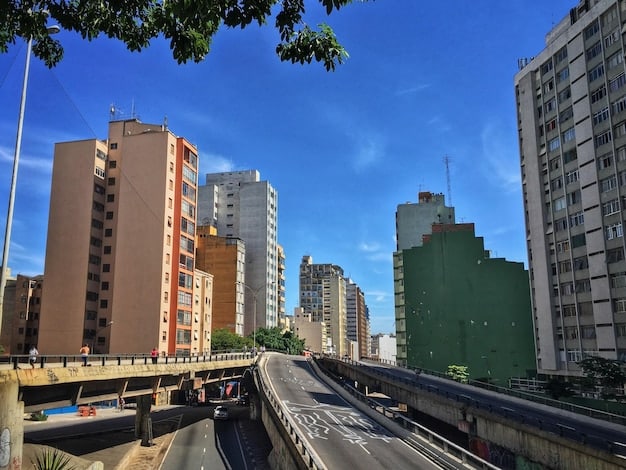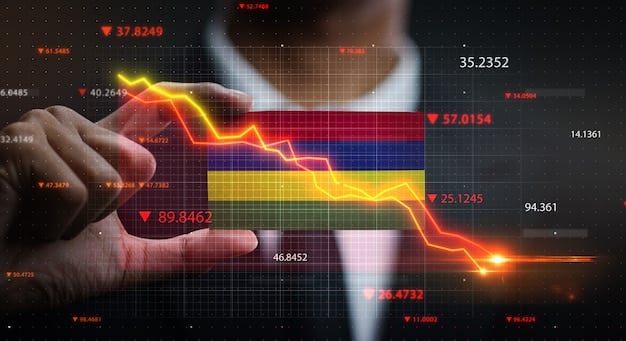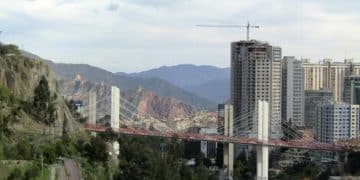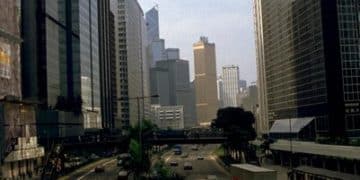Investing in Peru’s Stock Market 2025: Risks and Rewards

Understanding the Risks and Rewards of Investing in Peru’s Stock Market in 2025 involves analyzing economic stability, political factors, market volatility, and growth sectors to make informed investment decisions.
Are you considering Understanding the Risks and Rewards of Investing in Peru’s Stock Market in 2025? This guide provides insights to help you navigate this dynamic market.
Peru’s Economic Landscape in 2025
To effectively navigate the Peruvian stock market, it’s crucial to understand the country’s economic environment. This includes examining recent trends and future projections.
Current Economic Trends
Peru’s economy has shown resilience, driven by its mining sector and increasing domestic demand. However, global economic conditions also play a significant role.
Future Economic Projections
Analysts expect steady growth in Peru’s GDP, bolstered by government investments in infrastructure and social programs.
- Mining Sector: Strong commodity prices will continue to support the economy.
- Infrastructure Projects: Government-led construction projects will boost job creation and GDP.
- Consumer Spending: Rising disposable income will stimulate domestic demand.
Understanding these trends sets the stage for evaluating the market’s potential and the sustainability of investments.

Political and Regulatory Factors
Political stability and regulatory frameworks can significantly impact investor confidence and market performance. Therefore, a thorough understanding of these aspects is indispensable before investing.
Political Stability
Peru has experienced its share of political uncertainty. Stability is crucial for fostering a predictable investment climate.
Regulatory Environment
The government’s policies on foreign investment, taxation, and environmental regulations play pivotal roles in attracting and retaining capital.
- Investment Policies: Favorable investment policies are critical for attracting foreign capital.
- Taxation: Clear and stable tax laws provide certainty for investors.
- Environmental Regulations: Compliance with environmental standards is essential for sustainable projects.
Therefore, monitoring political developments and regulatory changes is essential for managing investment risks.
Overview of the Peruvian Stock Market
The Peruvian stock market, or Bolsa de Valores de Lima (BVL), has unique characteristics that investors should know.
Market Structure
The BVL is relatively small compared to other markets in Latin America, but it offers opportunities in specific sectors.
Key Sectors
Mining, financial services, and consumer goods are dominant sectors in the Peruvian stock market.
Market Volatility
Like any emerging market, the BVL can experience volatility due to global economic factors and local events.
Risks of Investing in Peru’s Stock Market
Investing in any stock market involves risk, and Peru’s BVL is no exception.

Economic Risks
Economic downturns, currency fluctuations, and inflation are among the key economic risks.
Political Risks
Political instability can lead to sudden policy changes that negatively impact investments.
Market-Specific Risks
Liquidity risk, information asymmetry, and regulatory risks are specific to the Peruvian market.
- Liquidity Risk: The limited number of participants may make it difficult to exit positions quickly.
- Information Asymmetry: Inequality in access to information can disadvantage smaller investors.
- Regulatory Risks: Changes in regulations can significantly affect investment outcomes.
Investors must conduct thorough due diligence and diversify their portfolios to mitigate these risks.
Rewards of Investing in Peru’s Stock Market
Despite the risks, investing in the Peruvian stock market can offer attractive rewards.
Growth Potential
Peru’s economy has the potential for significant growth, particularly in sectors like mining, agriculture, and tourism.
Diversification Benefits
Including Peruvian stocks in a global portfolio can enhance diversification and reduce overall risk.
Dividend Yields
Some Peruvian companies offer attractive dividend yields, providing a steady income stream for investors.
Strategies for Investing in Peru’s Stock Market
Different investment strategies can be employed to navigate the Peruvian market effectively.
Long-Term Investments
Investing in well-established companies with solid fundamentals can provide long-term capital appreciation.
Value Investing
Identifying undervalued stocks with growth potential can yield significant returns.
Growth Investing
Targeting companies with high growth rates can lead to substantial gains, but also carries higher risk.
- Market Analysis: Continuously monitoring global and local market conditions.
- Company Analysis: Rigorously evaluating financial health and growth potential.
- Risk Management: Implementing strategies to mitigate potential losses.
Adopting a well-thought-out strategy and adapting to changing market conditions is crucial for success.
Tips for US Investors
For investors in the United States, there are specific considerations when investing in Peru’s stock market.
Understanding Currency Risk
Fluctuations in the exchange rate between the US dollar and Peruvian sol can impact returns.
Navigating Tax Implications
US investors should be aware of the tax implications of investing in foreign stocks, including potential withholding taxes.
Using ADRs and ETFs
Investing through American Depositary Receipts (ADRs) and Exchange-Traded Funds (ETFs) can simplify the investment process.
| Key Point | Brief Description |
|---|---|
| 📈 Economic Growth | Peru’s GDP is expected to grow steadily, driven by key sectors. |
| ⚖️ Political Factors | Political stability is crucial for investment confidence. |
| ⚠️ Market Risks | Volatility and liquidity issues are notable risks. |
| 💰 Investment Strategies | Long-term, value, and growth investing can be effective. |
FAQ Section
▼
The primary sectors are mining, financial services, and consumer goods, which significantly influence market performance.
▼
Political instability can lead to policy changes, affecting investor confidence and market stability negatively.
▼
Key risks include economic downturns, currency fluctuations, and inflation, which impact returns and investment value.
▼
US investors can use ADRs and ETFs to simplify investing, and should understand currency and tax implications.
▼
Rewards include the potential for high growth, diversification benefits, and attractive dividend yields on investments.
Conclusion
Understanding the Peruvian stock market for 2025 requires a balanced view of its risks and rewards. By staying informed, diversifying your investments, and carefully considering economic and political factors, you can navigate this market effectively and capitalize on its potential.





